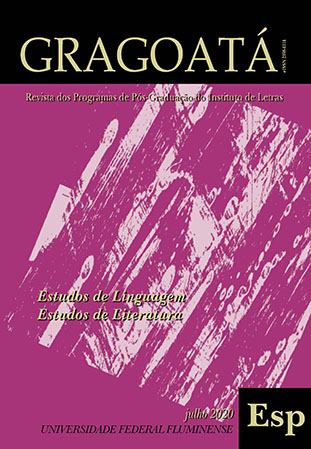Outras testemunhas: o tradutor toma a palavra
DOI:
https://doi.org/10.22409/gragoata.v25iEsp.34212Palavras-chave:
Original, Trauma, Tradução, Testemunho.Resumo
Traçando um paralelo entre tradução e testemunho, propomos discutir o processo tradutório d’Os sertões, de Euclides da Cunha, para o francês. No desenrolar da sua tarefa, os tradutores dessa obra, Antoine Seel e Jorge Coli, testemunham uma luta incessante com as línguas para reescrever um original que resiste à inscrição em uma forma diferente da qual foi concebido. Tradução e testemunho estão, portanto, cercados por um double bind, uma dupla injunção entre impossibilidade e necessidade de cumprir a promessa de traduzir o que resiste à tradução: o trauma ou o original. Atestamos essa dupla injunção na esteira do pensamento de Jacques Derrida em Torres de Babel (2002) e Demeure (2000), dois textos que problematizam a tradução e o testemunho como atividades necessárias e impossíveis. O original e seu autor demandam a tradução uma vez que não podem falar em outra língua sem o trabalho do tradutor. Embora reclamada, a tradução não transfere ou repete a totalidade de qualquer sentido, tampouco reproduz uma suposta voz autoral na língua de chegada. Para sustentar o argumento, discutimos como Os sertões tomam a forma de um trauma para seus tradutores. Além da escrita tradutória, investigamos os depoimentos de Seel e Coli sobre suas angústias ao testemunhar a narrativa traumática de Euclides. Tomamos a tradução desse testemunho como exemplo para argumentar que a tradução, no geral, é um processo no qual se testemunha um trauma na língua, uma luta com a própria língua para traduzir o que resiste à tradução.Downloads
Downloads
Publicado
Edição
Seção
Licença
AUTORIZAÇÃO
Autores que publicam em Gragoatá concordam com os seguintes termos:
Os autores mantêm os direitos e cedem à revista o direito à primeira publicação, simultaneamente submetido a uma licença Creative Commons Atribuição 4.0 Internacional (CC BY 4.0), que permite o compartilhamento por terceiros com a devida menção ao autor e à primeira publicação pela Gragoatá.
Os autores podem entrar em acordos contratuais adicionais e separados para a distribuição não exclusiva da versão publicada da obra (por exemplo, postá-la em um repositório institucional ou publicá-la em um livro), com o reconhecimento de sua publicação inicial na Gragoatá.
A Gragoatá utiliza uma Licença Creative Commons - Atribuição CC BY 4.0 Internacional.











